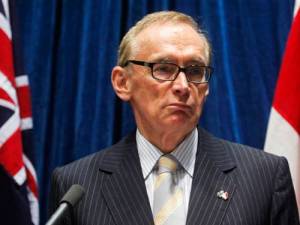The Government of Indonesia is fully aware of the problems existing in its easternmost province of Papua and has taken steps to reduce the gap and eliminate the feelings of injustice felt by the residents of the province.
The scarcely populated regions in the province do not seem to be at par with the rest of the country in terms of economic and social development, but the government is serious about advancing prosperity there.
During a joint press conference held with Australian Prime Minister Tony Abbott at the Merdeka Palace on Monday, President Susilo Bambang Yudhoyono stated that the government was sincere and serious about advancing prosperity in Papua.
“To the Australian Prime Minister, I say that the Indonesian policy to manage Papua is very clear, for we take the approach of welfare, justice and democracy,” the President said.
The head of state further pointed out that Papua was the region to which the highest development funds had been allocated in Indonesia, although there were local and structural problems that had to be managed well.
“Indonesia is a democratic country, and the problems in Papua are part of democracy because the region is an integral part of Indonesia. Indonesia`s sovereignty covers Papua as well,” Yudhoyono noted.
On the occasion, Yudhoyono also extended his gratitude for the Australian government`s statement regarding the country`s respect for Indonesia`s sovereignty.
“One thing is clear that Indonesia will take full responsibility to overcome the problems in Papua properly and wisely,” he went on.
Meanwhile, the Australian Prime Minister also appeased Indonesian sensitivities by taking an unusually tough line against protesters in Australia agitating for independence of the Indonesian territory of Papua.
“The government of Australia takes a very dim view… of anyone seeking to use our country as a platform for grandstanding against Indonesia. We will do everything that we possibly can to discourage this and prevent this,” Abbott said.
He also the admired Indonesian Government`s efforts to improve the autonomy and life of the people of West Papua.
The Australian Prime Minister stated that he believed that the people in West Papua could lead a better life and have a better future as an integral part of Indonesian nation.
The people of Papua were yet to enjoy the fruits of development and therefore felt isolated, Velix Wanggai, President Yudhoyono`s special aide for regional development and autonomy had said in August.
He added that the feeling of injustice with regards to economic and social gaps had been further exploited by the outlawed Free Papua Organisation (OPM), which had incited a fight for independence.
According to Wanggai, backwardness, disappointment, and dissatisfaction of the people of Papua had served as ammunition to incite resistance against the government.
However, Marinus Yaung, an international law and political observer at the Cenderawasih University (Uncen) opined that a peaceful dialogue between Papua and Jakarta was the best possible solution for the problems of Papua.
“We agree that Papua-Jakarta Dialogue will help solve the problem in Papua,” Yaung said in Jayapura recently.
He noted that the problem in Papua was not limited to economic and social development; but was a political problem that had to be solved through peaceful dialogue with Jakarta.
Meanwhile, a hearing of the People`s Assemblies of Papua`s two provinces–Papua and West Papua–at the end of July had indicated that the majority of people in Papua were in favor of a dialogue.
Therefore, the Director of the Democracy Alliance for Papua (ALDP) Latifah Anum Siregar said that all stakeholders in the region should support the Papua People`s Assembly (MRP) in recommending a Papua-Jakarta dialogue immediately.
“The regional administrations of Papua and West Papua, the regional legislative assemblies, and people of the two provinces should support MRP`s recommendations,” added Siregar.
Meanwhile, Manokwari-based Institute of Research, Analysis and Development for Legal Aid (LP3BH) Director Yan Christian Warinussy had noted in August that the Papuan people had repeatedly urged Jakarta to open a peaceful, neutral and transparent dialog, facilitated by a third party in a neutral place.
Such a dialog had long been called for, but the Papua People`s Council (MRP) and West Papua People`s Council (MRPB) had only shown appreciation for the call and given their recommendations now, he said.
“Therefore, LP3BH of Manokwari, which serves as an advocate for human rights in Papua, had urged President Susilo Bambang Yudhoyono not to close the door for a proposed Papua-Jakarta dialog in 2013,” Warinussy stated.
He said the proposed dialog should be held immediately, adding there was no reason for a delay.
Warinussy further stated that so far no response or appreciation had been shown despite the offer to facilitate a dialog with a system universally acceptable by the Papua Peace Networks.
As a result of the hearings held by official institutions, such as the MRP and MRPB, Jakarta was expected to react favorably to a proposed Papua-Jakarta dialog before the general elections in 2014, he added.
“A Papua-Jakarta dialog should be held to honor the aspirations of the 99 percent majority of the Papuan people,” he pointed out.
The MRP-MRPB hearing, which evaluated the implementation of the Law on Special Autonomy in the two provinces, had issued a number of recommendations including the holding of a Papua-Jakarta Dialog.
Supporters of the move are being drawn from youth organizations in Papua for immediate implementation of the proposed dialog.
Source: ANTARA News


